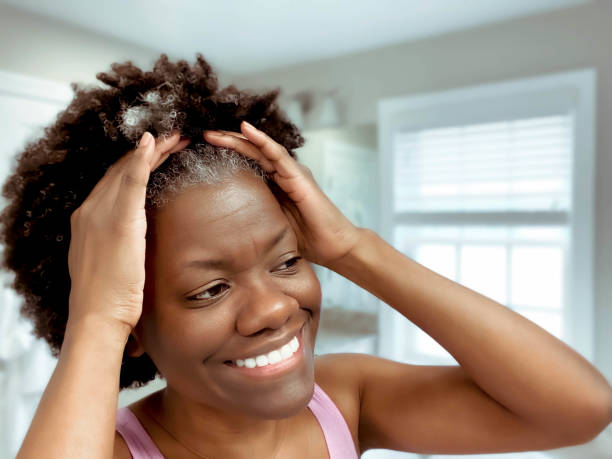
Menopause is a natural phase in every woman’s life, marking the end of menstrual cycles and a significant shift in hormonal balance. While it can bring freedom from periods and potential pregnancy, it also triggers several changes in the body that affect hair and skin. These changes are primarily driven by the decrease in estrogen and progesterone levels. Below are ten ways menopause impacts hair and skin, along with tips on how to manage these changes to maintain healthy, beautiful skin and hair.
RELATED: How To Regrow Thinning Hair
1. Thinning Hair
One of the most common beauty concerns during menopause is thinning hair. Reduced estrogen levels lead to a decrease in hair density, making hair strands finer and weaker. This often results in overall thinning, and in some cases, increased hair shedding or hair loss.
How to Manage:
- Use volumizing shampoos and conditioners to give your hair more body.
- Consider supplements rich in biotin, zinc, and other hair-healthy nutrients.
- Gentle scalp massages can improve circulation and promote hair growth.
2. Dry and Brittle Hair
Hormonal fluctuations can reduce the scalp’s oil production, leading to drier, more brittle hair. This can cause breakage and make hair appear dull and lifeless.
How to Manage:
- Opt for hydrating hair masks and oils such as argan or coconut oil to lock in moisture.
- Avoid excessive heat styling, which can exacerbate dryness and damage.
- Use sulfate-free shampoos that don’t strip natural oils.
3. Facial Hair Growth
A surprising side effect of menopause is an increase in facial hair growth. With estrogen levels dropping, testosterone becomes more dominant, which can lead to unwanted hair on the chin, upper lip, or jawline.
How to Manage:
- Regularly tweeze or wax small areas of facial hair.
- Consider laser hair removal or electrolysis for more permanent solutions.
- Prescription creams like eflornithine can slow down hair growth.
RELATED: 7 Ways to Prioritize Self-Care During Perimenopause and Menopause

4. Sagging Skin
The reduction in collagen production during menopause weakens the skin’s structure, leading to sagging, particularly around the jawline and cheeks. Estrogen is essential for maintaining skin elasticity, and its decline accelerates the aging process.
How to Manage:
- Incorporate retinoids or peptides into your skincare routine to stimulate collagen production.
- Regular facial exercises can help tone muscles and reduce sagging.
- Dermal fillers or skin-tightening treatments can provide more immediate improvements.
5. Dry Skin
Just as menopause dries out hair, it also affects the skin’s moisture levels. Estrogen stimulates oil glands, so without it, skin becomes drier and more prone to flaking or itching.
How to Manage:
- Switch to a richer, cream-based moisturizer that contains ceramides, hyaluronic acid, or glycerin.
- Avoid hot showers that can strip the skin of its natural oils.
- Consider using a humidifier at night to add moisture to the air.
6. Increased Sensitivity
With hormonal changes, the skin’s protective barrier weakens, which can lead to increased sensitivity. Skin that was once tolerant may now react to products, causing redness, irritation, or even allergic reactions.
How to Manage:
- Simplify your skincare routine by using fewer products with gentle, fragrance-free formulas.
- Look for products labeled for sensitive skin that contain soothing ingredients like aloe vera or niacinamide.
- Avoid harsh scrubs and instead, opt for mild chemical exfoliants like lactic or mandelic acid.
7. Wrinkles and Fine Lines
Collagen and elastin—proteins responsible for skin’s firmness—begin to break down more rapidly during menopause. The result is more pronounced wrinkles and fine lines, especially around the eyes, mouth, and forehead.
How to Manage:
- Use products containing retinol or vitamin C to boost collagen production and reduce fine lines.
- Sunscreen is essential to prevent further damage from UV exposure, which can accelerate the appearance of wrinkles.
- Hydrating serums with hyaluronic acid can temporarily plump the skin, making fine lines less visible.
RELATED: 5 Natural Remedies For Hyperpigmentation (Dark Spots on Your Neck, Cheek, Belly, Etc)
8. Hyperpigmentation
Changes in estrogen levels can lead to increased melanin production, resulting in hyperpigmentation or “age spots.” These dark spots typically appear on areas exposed to the sun, like the face, hands, and chest.
How to Manage:
- Use brightening products containing ingredients like vitamin C, kojic acid, or licorice root extract.
- Regular use of sunscreen with a high SPF can prevent further darkening of these spots.
- Professional treatments like chemical peels or laser therapy can effectively reduce hyperpigmentation.
9. Loss of Volume
Menopause often brings a loss of facial fat, leading to hollow cheeks, thinner lips, and a more gaunt appearance. This is due to the natural decline in estrogen, which affects fat distribution.
How to Manage:
- Fillers and injectables can help restore lost volume in areas like the cheeks and lips.
- Plumping serums and creams containing peptides or collagen-boosting ingredients can provide a temporary firming effect.
- A healthy diet rich in omega-3 fatty acids can support the skin’s natural fat layers.
RELATED: Acne over 30? Here’s How to Get It Under Control
10. Acne Breakouts
While menopause is often associated with dry skin, some women experience acne due to fluctuating hormones. The increase in androgens (male hormones) can trigger excess oil production, leading to clogged pores and breakouts.
How to Manage:
- Opt for oil-free moisturizers and non-comedogenic skincare products to avoid clogging pores.
- Consider treatments containing salicylic acid or benzoyl peroxide to control breakouts.
- For persistent acne, consult a dermatologist who may recommend hormone-balancing treatments.
Menopause can bring significant changes to hair and skin due to hormonal shifts, but understanding these changes and taking proactive steps can help manage their impact. From adjusting skincare routines to embracing new hair care habits, there are ways to maintain beauty and confidence throughout this transformative stage. Always consult with a dermatologist for personalized advice, especially when considering more advanced treatments.
By focusing on hydration, sun protection, and products that encourage collagen production, you can keep your hair and skin looking healthy, radiant, and youthful during and after menopause.








